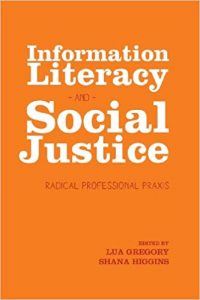- Critical Librarianship (also known as CritLit) "asks us to look more closely at the sociopolitical work both inside and out of our libraries" (McElroy, 2017). This approach emerged during the 1970s, with the popularity and study of critical pedagogy by Freire, Giroux, hooks, and other education scholars. Critical questions and acknowledges the structures of knowledge, organization, and power are linked (Drabinski, 2019). CritLit, as it has been referred to in social media discussions, tries to understand power structures and the practices within librarianship through a sociopolitical lens. Critical librarianship asks the following questions: "What counts as productive in our libraries? What value do we place in official knowledge imparted in the reference desk of information literacy sessions? What values do library collections and services embody? How can we surface and value what works beyond statistics? What does it mean to be a life-long learner, and how do we support this? (Drabinski, 2019). Other aspects included in critical librarianship and literacy are that it "aims to understand how libraries participate in systems of oppression" and find ways to disrupt it (Tewell, 2016).
- Critical Cultural Literacy falls under the spectrum of cultural competence. Both can be defines as:
[T]he ability to recognize the significance of culture in one's own life and the lives of others; and to come to know and respect diverse cultural backgrounds and characteristics through interaction with individuals from diverse linguistic, cultural, and socioeconomic groups; and to fully integrate the culture of diverse groups into services, work, and institutions to enhance the lives of both those being served by the library profession and those engaged in service. (Overall, 2009, 189-90).
In the specific case of critical cultural literacy, LIS professionals apply critical race theory and critical pedagogy elements. These aim to study the power dynamics surrounding the conditions of library patrons from multicultural backgrounds, i.e., those that have been historically underrepresented or marginalized. According to Cooke (2017; 2021), critical cultural literacy incorporates the following concepts:
- Social Justice
- Racial Literacy
- Emotional Literacy
- Information Behavior
- Historical Literacy
These frameworks and concepts serve and promote better services, representation, and spaces for multicultural communities in library spaces.
- Critical Race Theory (CRT) emerged in the 1970s due to the civil rights era in the United States. Its early proponents were Drek Bell, Alan Freeman, and Richard Delgado. CRT is invested in "studying and transforming the relationship between race, racism, and power" (Delgado & Stefancic, 2017). Some of the questions that CRT poses are:
- "How does one select library materials using the neutral framework when the materials aren't neutral?" (Chui, Ettarth, & Ferretti, 2021).
- How do libraries deracialize classification systems and subject headings?
- How do library buildings address access to BIPOC students? Furthermore, how is whiteness as property addressed in HBCUs and HSI?
- How is knowledge disseminated and taught? Are BIPOC voices included and fairly represented?

 Information Literacy and Social Justice by Lua Gregory (Editor); Shana Higgins (Editor)
Information Literacy and Social Justice by Lua Gregory (Editor); Shana Higgins (Editor) Informed Agitation by Melissa Morrone (Editor)
Informed Agitation by Melissa Morrone (Editor)